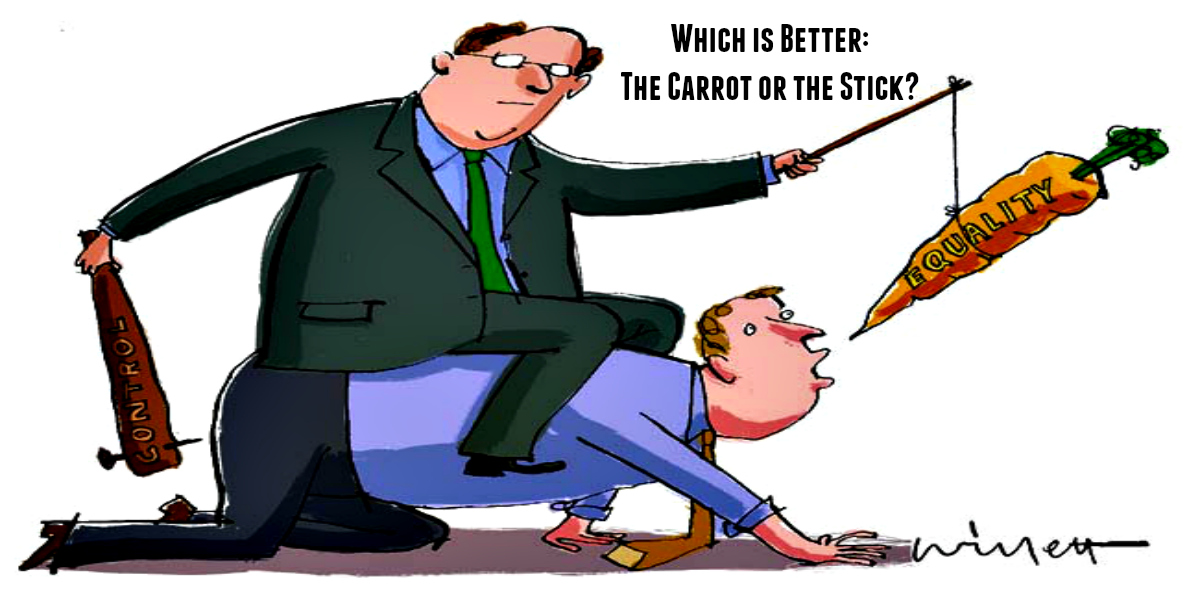The key to productivity is to have a meaningful and optimal incentive system. Fear is unfortunately a powerful motivator so it might be tempting to try and change behavior through punitive measures for poor performance or bad behavior. But it is a short term play. You will lose talent. On the other hand, a positive incentive, bonus or “bribe,” can also be powerful for those who are ambitious and motivated. But overly generous bribes can quickly turn someone entitled. So what is the best way to go? Which is better? The carrot or the stick?
* Episode 26: Cultivating Talent Nature vs Nurture
* Episode 24: Chemistry Matters: When All-Stars Fail
* Episode 53: Discussion with Bill Aulet on Disciplined Entrepreneurship
* Conventional incentive systems will tell us to give a carrot to reward behavior that is above par in order to give incentives for ambition to achieve excellence. And we should give the stick to punish that which falls below par to instill fear that will hopefully discontinue any performance that is sub-par. However, we live in times that are quite un-conventional.
* Look at the difference and evolution in grading and the US education system in the past 45 years
* Consider how sports’ contracts radically changed in the ’90s leading to compensation for expected value (e.g. “Big Dog” Robinson) rather than bonus for value already added (Michael Jordan)
* Need to manage a current workforce containing a range of Baby Boomers all the way down to the Millennials
* How do we create incentive systems to effectively gain productivity when we’ve lost par? Where has excellence gone? Why do we tolerate and even excuse lower than average performance and behaviors?
* Episode 26: Cultivating Talent Nature vs Nurture
* Episode 24: Chemistry Matters: When All-Stars Fail
* Episode 53: Discussion with Bill Aulet on Disciplined EntrepreneurshipSo how is a leader or manager to know how to design and implement effective incentive systems?
* Intrinsic behaviors…if you place a value on something that should be intrinsic, you are devaluing the reward the good behavior should bring.
* Carrot good behaviors…but they need to be ‘above and beyond’ giving rewards for just doing what is expected digs you into the abyss of the “Millennial Hole”
* Punish bad behaviors. No one should be given a bonus for ‘not screwing up’ again. After all…it just takes 1 bad apple to ruin the whole lot. However, if punishments are so prevalent that they instill fear in the workplace, then you’ve created a counter-productive environment.
* Understand what is the bribe?
* A meaningful incentive or ‘bribe’ must be determined by what the person whose behavior you are trying to influence. It isn’t about what YOU find valuable it is about what THEY perceive as valuable. If you are a good leader, you will know this.
* Money
* Experience
* Power/Title
* Know what an effective punishment looks like. What is appropriately painful to the person? It has to sting, but not injure so much that you render the person useless. And what hurts without demoralizing?
* Understand the short term play versus the long term play in designing and implementing an effective incentive system
* Design an effective incentive system by asking the key questions:
* What is ‘par’?
* Why do you need this incentive system?
* Who is effected by this incentive system?
* What behaviors does this incentive system impact?
